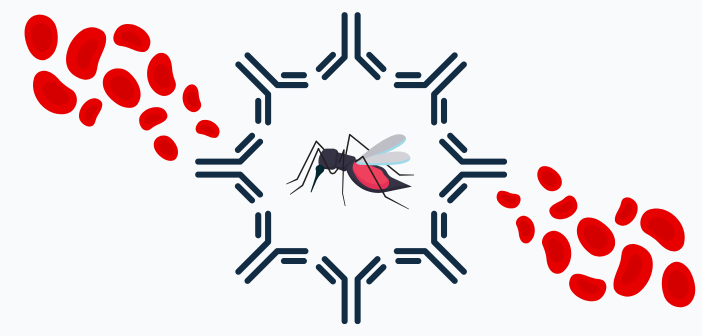Fighting malaria one antibody at a time

A novel class of antibodies could protect against malaria by binding a previously untargeted epitope on Plasmodium falciparum.
A study led by researchers at the National Institutes of Health’s (NIH) National Institute of Allergy and Infectious Diseases (MD, USA) has identified a new class of antibodies that target a novel region of the malaria parasite, using an antigen-agnostic screening strategy. Different from the parasite regions targeted by current vaccines, the findings reveal promising pathways for developing innovative prevention methods against this life-threatening disease.
Malaria, primarily caused by the parasite P. falciparum spread through infected mosquito bites, is one of the most severe public health problems, claiming hundreds of thousands of lives annually. The majority of these deaths disproportionately affect developing countries, particularly children.
Current prevention strategies such as vaccines and monoclonal antibody (mAb) therapies are effective, but new approaches are still desperately needed to increase global malaria control. While vaccines and mAbs focus on specific parts of the parasite, these newly discovered antibodies bind to a previously untapped epitope on the circumsporozoite protein (PfCSP) – a protein secreted in the sporozoite stage of the malaria parasite that is necessary for parasite development and cell invasion in humans.
Using an antigen-agnostic screening strategy, the researchers isolated sporozoite-binding human mAbs. After identifying novel antibody-binding epitopes on the sporozoite surface, while excluding antibodies that targeted conventional PfCSP epitopes, the team assessed the antibodies’ in vitro and in vivo function against the malaria parasite.
You may also be interested in:
- New monoclonal antibody treatment for malaria: a breakthrough on the horizon?
- Strategy and validation of a nonclinical generic plug-and-play antidrug antibody method for human monoclonal antibody biotherapeutics
- Infographic: monoclonal antibody production strategies using phage display vs in vivo immunization
The most potent of these antibodies, MAD21-101, demonstrated remarkable effectiveness in protecting mice against P. falciparum. Using mass spectrometric analysis, the team discovered that MAD21-101 targets a conserved region called pGlu-CSP, exposed during a critical stage of the parasite’s development. Interestingly, MAD21-101 does not bind to the PfCSP central repeat region like in the currently used vaccines RTS,S/AS01 and R21/Matrix-M. This unique target could pave the way for vaccines and treatments that enhance immune response without interfering with the efficacy of existing vaccines.
These antibodies could be especially valuable for at-risk populations, such as infants who have yet to receive malaria vaccines.
Beyond malaria, the study’s innovative approach to identifying new antibody targets is encouraging for tackling other infectious diseases. While more research is needed to expand on these findings, the discovery represents a significant leap forward in the fight against one of the world’s deadliest diseases.





